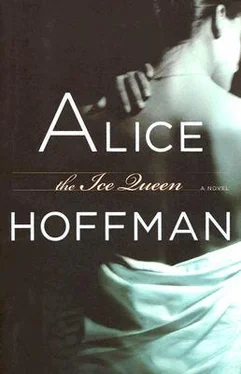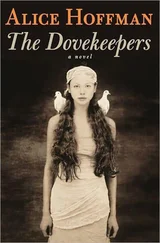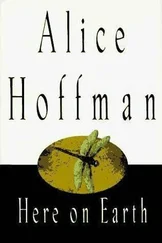Nina laughed, but the sound was dry. Nothing funny here.
“I’m the one destroyed,” she said.
“You’re planning to kill yourself.”
“Oh, far worse.”
Nina turned and left the room, so I followed her. I went down the dark hall. Nina was standing in the study, now cleared of furniture. She had painted one wall yellow. She hadn’t bothered to turn on the overhead light, but the room was glowing. Yellow did that. This yellow.
“Nice color,” I said.
Nina sat down on the floor, legs crossed. She’d covered the carpet with a drop cloth. I sat across from her and watched her cry. When she was done she wiped her eyes with the palms of her hands.
“You want to know what love is? It’s the thing that ruins you.”
Nina looked straight at me. She reached out and for a second I thought she meant to hit me. I wouldn’t have blamed her if she had. I was rude, asking too many questions, insinuating myself where I wasn’t wanted, spying on her. Instead, she took my hand and put it on her stomach. She was farther along than anyone would have guessed. She’d kept her secret well. I could feel the baby moving.
“This isn’t ruin. This is wonderful. Why would you ever take out that book?” I said.
I looked right into her, and I saw what love was to her.
“The book was for him. In case it got too hard for him and he didn’t want to live through it. In case I couldn’t stand to watch his pain.”
I didn’t want to understand what she was talking about. It was ruin; she was right. It was opening yourself to be destroyed. One minute you have everything. And then the next it’s all gone.
This was that time.
“He has pancreatic cancer. He wants to work as long as he can, which they say is less than a month. The baby will be here after the first of the year. The book was in case he wanted it. To go as he chose. It’s his right, after all. It’s his life. But then I couldn’t go through with it. Even a minute less time of him in the world would be too hard. I returned it.”
Nina’s face was blotchy; the rims of her eyes were a pale red. Even I could see that color.
“I can paint the room and you can watch me,” I said.
“We can paint tomorrow,” Nina suggested. “At least there’s time for that.”
We sat there in the dark, holding hands. And then I knew the answer to my question.
This is what it was.
A s soon as it was strong enough, I set the mole free in the yard at dusk. I put it on the grass near the hedge and it disappeared. One minute it was there, the next it was gone. I suppose this was familiar territory, the scent of the hibiscus, the feel of the dried grass. The mole didn’t leave any tracks; it just vanished.
I thought about the way old blind women in stories found their lost loves and recognized them even though fifty or a hundred years had passed, even if their husbands or lovers had been turned into stags or monsters. I thought about how the familiar imprinted itself on you — a hedge, a scent, a touch. If someone had taken a photograph of Lazarus and me together and pinned it to a wall, anyone who’d seen it would have thought, They aren’t meant for each other. They don’t belong together . So we didn’t take any photographs. I had questioned how it was possible for this man to love me all along, but I had finally begun to understand the reason: I knew him. If he came to me as a bear or a deer, I would still know him. If I were blind, if it was at dusk, if a hundred years had passed, I’d still know.
That couldn’t be taken away, despite ruin, despite time.
That night I drove out and we went walking through the orchard in the dark. During the day, the workers Lazarus had hired called to one another and the picking machinery was noisy. But at night you could hear every breath, every beetle.
I told Lazarus about my brother. I looked for blame everywhere: if we’d never lived in New Jersey, if we’d breathed different air, if he’d had a different diet, had never come to Florida, if we’d had different parents, grandparents, a different genetic makeup, maybe his cancer wouldn’t have happened. There was another, earlier theory my brother had told me about, the uncertainty principle, a theorem that predated and informed chaos theory. The simple fable to illustrate it explains that a cat will live or die depending on the utterly random decay of a single atom. And so it was for Ned. One cell affected another; one bloody random cell utterly defined everything. Why it should happen to him, it was impossible to know. There were not hundreds of possible answers, but thousands. All unknowable and random. All out of reach.
“What do I do for him?” I asked Lazarus. I thought a dead man would know such things.
Lazarus laughed. He rarely did. “You’d have to ask him. It’s different for everyone.”
“If you had a few weeks to live, how would you want to live it?”
I wanted him to say, Like this, walking with you in the dark. I wanted him to help me through, but Lazarus wasn’t like that. It wasn’t his fault. He was too trapped in his own life to really think about someone else’s.
“If it was me, I’d want to be free. Like I used to be. I thought my life was nothing, until I lost it. If people knew who I am, they’d want to know what happened to Seth, and I doubt they’d believe me. They’d think I killed him, took his money. So here I am. Stuck.”
Trapped in the wrong shoes, in the woods where every path led back to the exact same place. I understood how Lazarus might want to be in his own skin again. This wasn’t his life. That was why I wanted to remember everything about this night. I was going to lose it, all of it, I could tell standing there. Sooner or later. Ruin. I looked at every leaf, every star.
“I think I’ll be found out anyway,” Lazarus said. “I think people are starting to realize I’m not the right Seth Jones.”
The feedstore had balked the last time he’d tried to make a transaction over the phone. Why didn’t he ever come in to place his order? He’d had to talk to the manager, who had known the real Seth Jones and who said, “What’s wrong with you, Jonesy? Frog in your throat?”
“Flu, damn near pneumonia,” Lazarus had answered. But he was worried. The year of their bargain had passed. Come and gone. He’d been thinking about leaving, and now he thought harder. Maybe he would already be gone if he hadn’t made a promise to the old man. If I hadn’t driven out, wearing that red dress. Filled my mouth with ice and kissed him.
Feel lucky for what you have when you have it. Isn’t that the point? Happily ever after doesn’t mean happy forever. The ever after, what precisely was that? Your dreams, your life, your death, your everything. Was it the blank space that went on without us? The forever after we were gone?
So now. So here. So him. The heat, the black night, the stars, the moment, the ever after floating inside of us.
There was something wrong with the crop. That was the other reason he didn’t feel right about taking off. He led me out to the place where lightning had struck. A few cars passed on the road, but no one paid any attention. We were a man and a woman walking through the past. The hole in the ground had widened greatly, the earth was falling in on itself, inch by inch, revealing a rocky, hard core. At the outer circle more and more trees were dying. One day they were filled with fruit, the next they were leafless and black.
Around the circle, there were still a few trees with red oranges. Now I saw it. Not icefruit or snowballs, but ruby red. Red worlds, red globes, beautiful in the dark. How could I have been so stupid to ignore everything I’d had in my life? The color red alone was worth kingdoms.
Читать дальше












